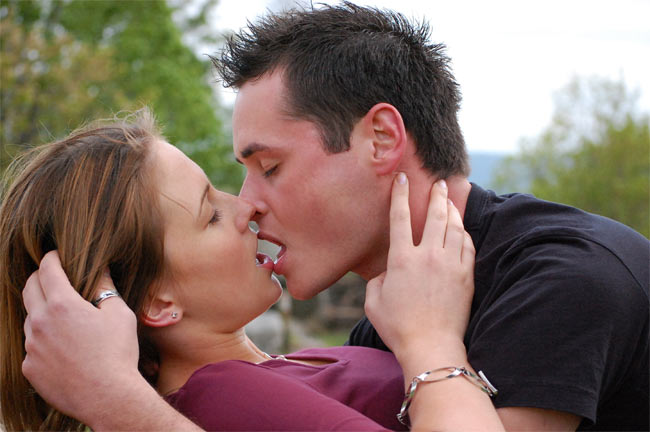Study Debunks Myth That Women Want Sex Less

Bachelors might have sex on their minds more than their single female counterparts, but once in a committed relationship, men and women have similar attitudes toward the act, a new study finds.
The results, published in the April issue of the journal Sex Roles, reveal how sexual stereotypes, in which guys want to go for it and gals tend to resist, don’t hold when romantic feelings come into play.
“Men experience a lot of pressure in our society to have sex with a number of different partners,” said one of the study’s researchers, Paul Perrin, a graduate student in psychology at the University of Florida, “the opposite of what women experience as kind of the gatekeepers of sexuality.”
Past studies, the scientists point out, have shown that compared with women, men are more sexually permissive, endorse casual sex at higher rates and masturbate more often.
And even in dreamland, men are from Mars and women from Venus. A recent study showed men were more than twice as likely as women to report dreams about multiple sex partners.
Sex spin factor
Tom Tiegs of UF and Perrin, along with their colleagues, surveyed 208 women and 131 men in an introductory psychology course there. The students rated 160 statements on a scale ranging from “strongly disagree” to “strongly agree” regarding their sexual behaviors and attitudes. The statements fell into four categories.
Get the world’s most fascinating discoveries delivered straight to your inbox.
In category 1, “sex as personally and physically pleasurable,” statements included:
- I should get drunk to enhance my sexual experience.
- If I want to be close to someone, I should have sex.
- I should have sex with my partner so he/she will not leave me.
- I should have sex with as many people as possible.
In category 2, “sex as beneficial in creating positive feelings about oneself,” statements included:
- Sex makes my partner love me.
- I feel attractive after sex.
- I trust my partner more after sex.
In category 3, “sex as personally costly in terms of having negative emotional, psychological or physical consequences,” statements included:
- Sex makes me feel guilty for violating my morals.
- God will punish me for having sex.
- Having a one-night stand makes me feel cheap.
- I will get an STD by having sex.
In category 4, “sex as a violation of social injunctions," statements included:
- I should engage in premarital sex.
- I should be with my partner a long time before I have sex.
- I should not have sex because I’m too attached to someone I’m having sex with.
Sexual feelings
While women placed more emphasis on the emotional aspects of sex, men focused more on the physical side of sex. Men were much more likely to find sex personally and physically pleasurable, while women were more likely to think sex violates social taboos.
Thoughts often turn into actions. “Sexually restrictive gender roles too often become self-fulfilling prophecies because women know that they are expected to be less sexual than men,” the scientists write, “and men know that they are expected to be more sexual than women.”
Men gave much higher ratings for risky sexual behaviors, such as “I should have sex with as many people as possible,” than women. And women were more apt to endorse waiting longer and not engaging in premarital sex.
When Mr. Right shows up, however, women ditch society-imposed gender roles, warming up to sexual pleasures, the researchers found.
In the context of an intimate relationship, both genders expressed that sex was important as a way to bring couples closer, to help maintain healthy relationships and to increase one’s self confidence.
“People in romantic relationships give more importance to their own feelings and their partners’ than they do to social expectations about sexual behavior,” Perrin said.
- Survival Skills: Why Sex is Good
- The Sex Quiz: Myths, Taboos and Bizarre Facts
- A Brief History of Human Sex
Jeanna Bryner is managing editor of Scientific American. Previously she was editor in chief of Live Science and, prior to that, an editor at Scholastic's Science World magazine. Bryner has an English degree from Salisbury University, a master's degree in biogeochemistry and environmental sciences from the University of Maryland and a graduate science journalism degree from New York University. She has worked as a biologist in Florida, where she monitored wetlands and did field surveys for endangered species, including the gorgeous Florida Scrub Jay. She also received an ocean sciences journalism fellowship from the Woods Hole Oceanographic Institution. She is a firm believer that science is for everyone and that just about everything can be viewed through the lens of science.


